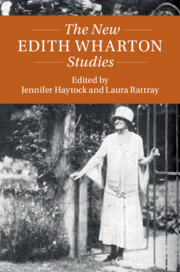Book contents
- The New Edith Wharton Studies
- Twenty-First-Century Critical Revisions
- The New Edith Wharton Studies
- Copyright page
- Contents
- Notes on Contributors
- Acknowledgments
- Editions and Abbreviations
- Introduction
- Part I Self and Composition
- Chapter 1 Creative Process and Literary Form in Edith Wharton’s Archive
- Chapter 2 Wharton’s Letters: Glimpses of the Whole Edith Wharton
- Chapter 3 Edith Wharton and the Business of the Magazine Short Story
- Part II International Wharton
- Part III Wharton on the Margins
- Part IV Sex and Gender Revisited
- Bibliography
- Index
Chapter 3 - Edith Wharton and the Business of the Magazine Short Story
from Part I - Self and Composition
Published online by Cambridge University Press: 28 November 2019
- The New Edith Wharton Studies
- Twenty-First-Century Critical Revisions
- The New Edith Wharton Studies
- Copyright page
- Contents
- Notes on Contributors
- Acknowledgments
- Editions and Abbreviations
- Introduction
- Part I Self and Composition
- Chapter 1 Creative Process and Literary Form in Edith Wharton’s Archive
- Chapter 2 Wharton’s Letters: Glimpses of the Whole Edith Wharton
- Chapter 3 Edith Wharton and the Business of the Magazine Short Story
- Part II International Wharton
- Part III Wharton on the Margins
- Part IV Sex and Gender Revisited
- Bibliography
- Index
Summary
Making the most of her good fortune to be writing in one of the most dynamic chapters in the history of the American periodical, Edith Wharton sold her stories to the genteel monthlies, slicks and pulps, where her short fiction garnered a readership of millions by the end of her career. Re-placed in their original magazine frames, her short stories chart Wharton’s response to the different print cultures in which she wrote and this essay explores how, as the market developed, so, correspondingly, did Wharton’s narrative response to the stories’ ideological and physical publishing context. Here I argue that, when read in the very different magazines in which they were originally published, from the early genteel periodicals to the later mass magazines, distinct patterns in the stories emerge, both in terms of Wharton’s narrative poetics, and the techniques she uses in her increasingly crafted and wry assessment of the industry which she spent a lifetime courting and criticizing.
Keywords
- Type
- Chapter
- Information
- The New Edith Wharton Studies , pp. 48 - 62Publisher: Cambridge University PressPrint publication year: 2019
- 1
- Cited by

